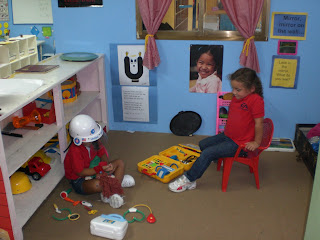



Kindergarten Overview 2008-2009
Learning takes place when:
- Children make connections between their thoughts and their experiences with materials, ideas and people.
- Children play directly
- Activities are creative and require intense involvement
- Children feel successful because they independently complete tasks they have defined for themselves (completing puzzles, building houses with blocks, creating a collage or experimenting with design and color).
- Learning is facilitated
In the Early Childhood Program at EA, we aim to promote learning by creating a child-centered environment that focuses on all aspects of a child’s development. The following is a guideline of the developmental areas and goals we will adhere to in our program and a description of how these outcomes will be met throughout the year.
Emotional Development
Focus: trust, self-concept, self-esteem, autonomy
Ultimate Goal: for children to feel lovable, valuable and competent
Mathematical Development
Focus: physical knowledge, perception, problem solving
Ultimate Goal: for children to integrate knowledge and experiences as they construct new or expanded concepts
Communication Development
Focus: listening skills, expressive language, build a receptive language
Ultimate Goal: for children to interpret accurately the communications of others as well as to begin to communicate effectively themselves
Language and Literacy Development
Focus: concept of print, appreciate books and enjoy books, phonological awareness, use knowledge to connect letters and sounds, develop pre-literacy skills.
Ultimate Goal: for children to develop an awareness, appreciation and knowledge of written communication
Social Development
Focus: interact with adults and peers
Ultimate Goal: for children to develop successful patterns of interactions as well as internal controls and social values
Physical Development
Focus: body awareness, large and small muscle development, physical health
Ultimate Goal: for children to achieve mastery of the environment through improved body control; to develop attitudes, knowledge, skills and behaviors related to maintaining, respecting and protecting their bodies
Creative Development
Focus: enjoyment, insight, stimulation, satisfaction
Ultimate Goal: for children to integrate feeling, thought and action within art, music and other sensory experiences
Knowledge and Understanding of the World
Focus: observe, investigate, inquire, and make connections with the world outside of school
Ultimate Goal: for children to explore their outside world (school communities, seasons, holidays, etc)
Centers: A Child-Centered Environment
Children learn best when they are actively involved in their own environment. Center time is designed to encourage exploration and independence that begins to take place naturally for children in kindergarten. It is a time that supports children's curiosity and imagination through forms of play in an emotionally safe learning environment. Children interact with the materials and other classmates they encounter at the centers. They explore, experiment with and discover patterns, and most importantly, they begin to develop their social participation skills at various levels.
Children are learning to share equipment, and connect with one another in several ways. Some children may choose to observe others playing, some may choose to interact by only talking to the other students, and some may enjoy being a role model or "teacher" and explain how certain materials are used in each
center. Children are free to engage at their own level of interest and readiness by which they can communicate with one another. Often during center time, you may hear children share their experiences, thoughts and feelings with one another through various ways.
In the Early Childhood Program at EA, we have the following centers available for children:
Writing and Drawing( literacy)
Art
Creative Play
Building
Puzzles and games
Math (and other fine motor games)
Reading Corner
Listening (books on tape)
Computer
Our Early Childhood program celebrates the whole child and the development of every aspect of our curious learners. The teachers carefully plan centers in order to encourage exploration, independence and progress in all areas of a child’s development. They act as facilitators of learning and children receive differentiated small group instruction for math, literacy and theme development.






No comments:
Post a Comment